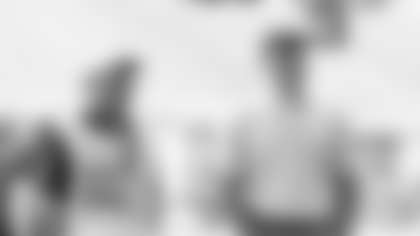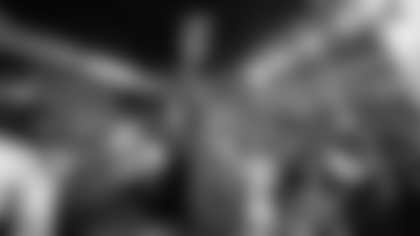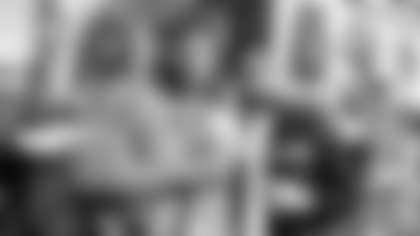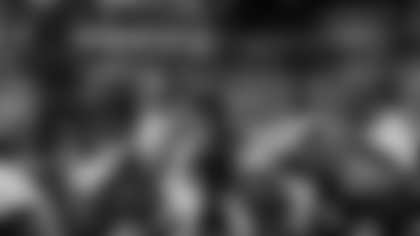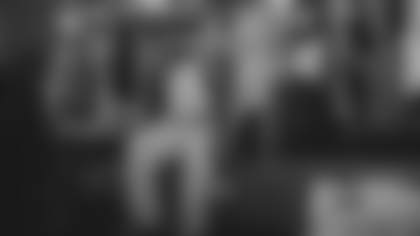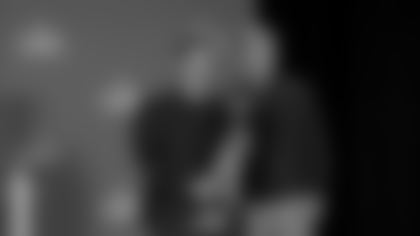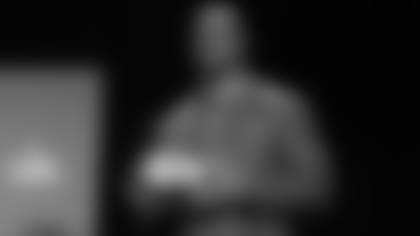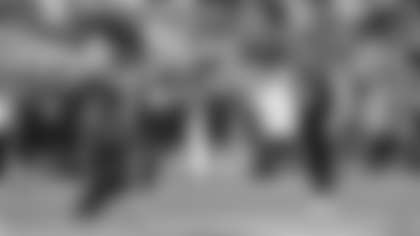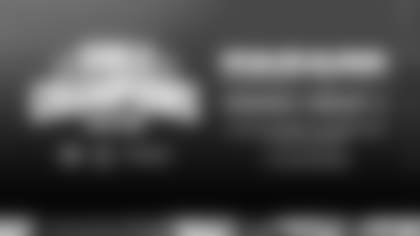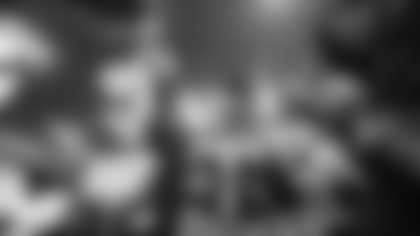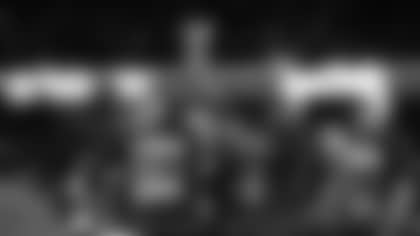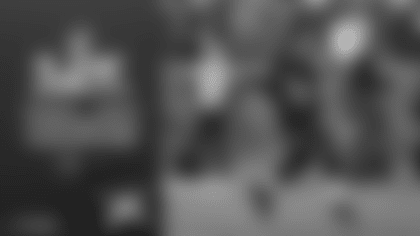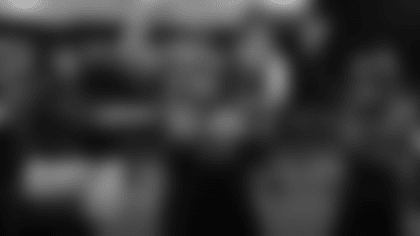Before he will share his story, Hugh Macdonald needs you to know this isn't about him.
Yes, Hugh, the father of Seahawks coach Mike Macdonald, needs a new kidney, and so far, he and his family have been unable to find a match. And yes, he's obviously hoping for an outcome that ends with him receiving a new kidney to put an end to his current three-day-a-week dialysis routine.
But Hugh Macdonald only wants to talk about his battle with kidney disease "if the focus isn't on me."
Macdonald, a West Point graduate who served in the Army for several years before transitioning to civilian life, sees his story "as a vehicle to tell a story that really focuses on veterans. There are a lot of vets who need kidneys."
That's why he'd rather you pause reading this story and head to dovetransplant.org where you can learn how to help veterans in need of a kidney donation. Done? OK, you can keep reading this story now.
Despite an active lifestyle that includes a shared love of golf with Mike, Hugh developed hypertension in recent years, which in turn led to kidney disease that progressed rapidly enough that, this spring, he was told he needed to go on dialysis and would eventually need a kidney donation.
Macdonald's story, and that of many other veterans needing a kidney donation, is told at DOVE, an organization that’s goal is to find, educate and support prospective living donors for veterans in need of a kidney donation.
Hugh Macdonald would love it if someone read his story and was inspired to see if they are a viable candidate for donation, but he'd also be just as thrilled if that donation helps another veteran in need as he would if it were a match for him.
"Veterans do so many things for our country, here's a way people might be able to pay it back to the many veterans who are in need," he said. "I want to make people aware that there are ways that you can help other people that you might never even know about and give a tremendous gift. When you do that, the lives you impact and improve and help, you can't imagine the difference that makes."

"My dad is just such a steadying force."
To the son who grew up learning life lessons from Hugh Macdonald, it hardly comes as a surprise that Hugh sees his own serious condition as a chance to help other veterans, and that he says doing dialysis three days a week is "by no means is it a chore, it's a blessing," because that dialysis is keeping him alive.
"That's the example that he sets for my sisters and I and the rest of our family, it's humility and selflessness and trying to help other people all the time," Mike Macdonald said. "So I'm not surprised. That's him. My dad is just such a steadying force. Talk about high character, high integrity, a right and wrong way to go about things. I'm sure he's thinking about what type of example he's trying to set for his kids. Those are the things that are going through his mind. This is an opportunity to pave the way for his family on how to handle adversity, things like that. That's how he thinks, it's pretty cool."
Throughout his first year with the Seahawks, Mike Macdonald's reverence for the military and the people who serve has regularly been on display, be it in the visitors he brings to practice or the language he uses with the team and in press conferences or several other little things that demonstrate the influence of growing up the son of a West Point man.
"When I was a kid, I went to bed at night on West Point stories," he said. "Those were my bedtime stories as a kid. So that's really as far back as I can remember, it was just the pride that my dad had with his classmates and the way they impacted the world, and then just understanding these are the people that have volunteered to put it on the line for our country. There's a deep respect for that. My dad, he was in the military right at the end of the Vietnam War, and I remember one of the first times I ever saw my dad cry was at the Vietnam Memorial. That was a really moving experience when I was a kid, just seeing how emotional he was."
As a child, Mike Macdonald was moved as he witnessed his father's respect for those who made the ultimate sacrifice, and now all these years later, Hugh Macdonald is setting another example for Mike and his daughters Maggie and Kate. Yes, Hugh Macdonald needs your help, but so do a heck of a lot of other veterans, and he wants to make sure people understand that the father of an NFL head coach is no more or less deserving of consideration for what is a very unselfish gift.
And Hugh Macdonald has learned enough about kidney donation in recent months to know that it's a relatively safe procedure, especially for the donor who is extremely well-vetted before being approved as a donor. But there's also the reality that, as he puts it, "it's very, very difficult to say to someone, 'Hey, I need a kidney.' You just can't do it."
Here at Virginia Mason Athletic Center, however, there are two people uniquely qualified to ask you to do it.
"It's A Whole Different Life I'm Living Now."
Not long after he moved to Seattle to take a job with the Seahawks, Alex Buford began having some unusual symptoms that a healthy 20-something shouldn't be experiencing. Then, on an easy hike with friend and co-worker Kyle Dougherty, Buford passed out, leading to Dougherty having to help Buford back from the trail to the car. More unexplained illness followed until, in 2022, Buford landed in the emergency room after contracting COVID-19, at which point he was diagnosed with Stage 5 kidney disease.
Buford went on a seven-night-a-week dialysis regimen, but eventually even that wasn't going to be enough. He needed a new kidney.
Family member after family member was tested, only to be told they weren't a match. That process, while unsuccessful, turned out to be a blessing for Buford's brother, Jeremiah, who found out he had Stage 3 kidney disease. With that earlier diagnosis, Jeremiah was able to control his hypertension through diet and exercise, reversing the kidney damage and avoiding his brother's fate. After several months of striking out on potential donors, things were starting to look bleak for Buford until Dougherty, unable to get an idea out of his head, took a leap.
"I was just in the background contemplating, OK, what does it look like to even try or see if I'm a match," Dougherty said. "In my head I was like, I will never be a match. There's no way. I mean, what are the odds?"
Dougherty remembered, several years earlier, seeing a car with a plea for a kidney donation painted in the back window, and he couldn't get the idea out of his head that somewhere, someone might have given up a kidney to save a complete stranger.
"I just remember vividly thinking, 'How crazy is that, that a random person would donate to someone to save their life?' And I've always been fascinated by someone choosing to do something like that," he said. "Years later I'm like, 'I know someone that needs it.'… I just felt like, I was healthy and the more research I did about it, I was able to learn and understand that if you go into it healthy and they prove that all your hereditary stuff is good and your blood's good, then your outlook on your health for your future is good. There's a very high chance that you come out of it and live a pretty healthy lifestyle. You're going to live a very normal life."
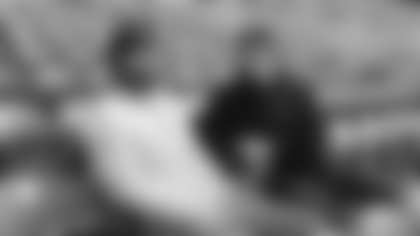
So Dougherty began the process of becoming a living donor, and against pretty long odds, he proved to be a match. After more than a year of preparing, a process that included giving up alcohol and improving his diet, Dougherty donated a kidney to Buford last June.
Dougherty won't sugarcoat it, the recovery was tough at times, but he bounced back quickly, and less than a year later he was back to an active lifestyle that included playing basketball, flag football and charging down mountains on skis.
Sitting together almost exactly a year after their surgeries, Buford can't overstate how meaningful Dougherty's donation was.
"The hardest thing you'll ever ask somebody is asking for their organ," Buford said. "I had to do that with Kyle, and that's the greatest feeling. He could have easily tapped out. He'll tell you, he went through a year and a half of tests and having to stop things and lose weight and just hurdle after hurdle, and he never gave up one time. Those things, I mean, you asked me how it feels, you can't put it into words."
For Buford, the effects of the transplant were felt the moment he woke up from the surgery.
"It's the night and day, the feeling," he said. "I didn't realize how sick I was when I was on dialysis. I was just so used to my body feeling that way. Then, I go back and I see old pictures of me and I look like a skeleton.
"That's the only way I can explain it. I didn't know what it was like to feel alive. I thought I was living, but I wasn't. It's a bomb, a whole different human literally. Being stuck on dialysis, it's life changing, mentally. When you're off of it, it gives a whole different perspective of life, having to just be on this machine to stay alive. Then, I remember when Kyle told me, he called me to his house, and he told me that he was going to do it. For the two and a half years I was on dialysis, I was honestly in a depression, just scared of dying. When he gave me that news, it was the most confident I had felt in two and a half years. Then after the transplant, you could physically see I'm a different human. I knew as soon as I woke up from the surgery."
Leading up to the surgery, Buford began to feel some guilt about what his perfectly healthy friend was about to put himself through.
"There were points where I was feeling bad, and I kept texting Kyle. I was like, 'Dude, if you want to back out, you can. You don't have to do this,'" Buford said.
Dougherty didn't back out, and his donation was both life saving and life changing for Buford.
And that's why Buford, having been through this, can more comfortably do what Hugh Macdonald can't—ask people who are able to look into kidney donation. Living kidney donations last significantly longer than kidneys from deceased donors, and they make all the difference in the world to people in need of a donation, including veterans like Hugh.
"Selfishly, I'd say, please do it," Buford said. "Honestly, Kyle saved me, and it's a whole different life I'm living now. Even from before I was on dialysis, that's a whole different life I'm living. I was eating fast food a lot, not exercising, and now I'm cooking all the time, super healthy, working out five times a week."
Hugh Macdonald is still waiting for his life-changing donation, and maybe sharing his story lead will lead to that outcome. But while he would welcome that, the real success story would be if his battle with kidney disease could lead to multiple lifesaving donations for veterans everywhere.
"I don't want the focus to be, 'You need to get Hugh Macdonald a kidney,'" he said. "I'm very thankful people are thinking of me, but at the same time, what's really important to me is that this makes more people aware of how they can help all veterans."
Those interested in learning more about living kidney donations for veterans can do so at dovetransplant.org.




